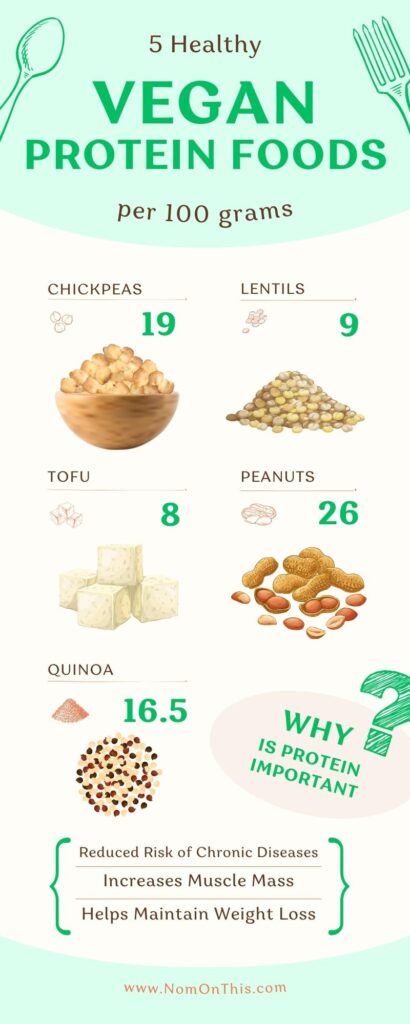Aaah, the century-old (don’t quote me on that) myth of vegans dying of protein deficiency every year. We hear it all the time: if a friend decides to go vegan, the first question that is going to be asked is “Where will you get your protein?” followed by “I could never get rid of cheese!” While the American diet relies a lot on animal protein, a trend has been rising these past years where people have decided to leave animal products behind. So, where can you get protein if you decide to go vegan? Let’s take a look at the choices available to you.
Animal Protein vs Plant Protein
The decision to leave animal protein behind can cause a bit of uncertainty when it comes to cooking new meals. When we are used to eating chicken, beef, or fish on a daily basis, it can become overwhelming to find alternatives to new protein sources. Another thing that goes hand-in-hand with switching to a different dietary lifestyle is that it is also easy to disregard the nutritional value of food. Let’s take a look at the pros and cons of both types of protein.

Animal protein and plant protein both have their own set of advantages and disadvantages. The choice between them often depends on individual dietary preferences, ethical considerations, and health goals. Here are the pros and cons of each:
Animal Protein:
Pros:
- High-Quality Protein: Animal proteins are considered complete proteins, containing all the essential amino acids the body needs for various functions.
- Rich in Nutrients: Animal sources often provide essential nutrients such as heme iron, vitamin B12, zinc, and omega-3 fatty acids, which are important for overall health.
- Muscle Growth and Repair: The amino acid profile of animal proteins makes them particularly effective for muscle growth and repair, making them popular among athletes and bodybuilders.
- Satiety: Animal proteins are often more satiating, which may help with weight management by reducing overall calorie intake.
Cons:
- Saturated Fat and Cholesterol: Many animal sources are high in saturated fat and cholesterol, which can contribute to heart disease and other health issues when consumed in excess.
- Environmental Impact: The production of animal proteins, especially red meat, has a higher environmental impact in terms of greenhouse gas emissions, land use, and water consumption.
- Ethical Concerns: Many people have ethical concerns about the treatment of animals in the meat industry, leading to a preference for plant-based alternatives.
- Cost: Animal proteins are often more expensive than plant-based proteins, making them less accessible for some individuals.

Plant Protein:
Pros:
- Lower in Saturated Fat and Cholesterol: Plant proteins are typically lower in saturated fat and cholesterol, which can be beneficial for heart health.
- Fiber and Nutrients: Plant sources often come with added benefits like dietary fiber, antioxidants, vitamins, and minerals, contributing to better overall health.
- Environmental Sustainability: Plant-based proteins generally have a lower environmental footprint, as they require fewer resources and produce fewer greenhouse gas emissions.
- Ethical Considerations: Choosing plant-based proteins aligns with the ethical beliefs of those who are concerned about animal welfare.
Cons:
- Incomplete Amino Acid Profile: Some plant sources may lack one or more essential amino acids, making it important to diversify protein sources to ensure a complete protein intake.
- Digestibility: Some plant proteins may be less digestible than animal proteins, requiring larger quantities to meet protein needs.
- Texture and Flavor: Plant-based protein sources may have different textures and flavors, which can be an acquired taste for some people.
- Allergies and Sensitivities: Plant proteins like soy or nuts can trigger allergies or sensitivities in some individuals.
So Where Can I Get My Protein as a Vegan?

Here’s the fun part! No, you won’t die of protein deficiency as a vegan. In fact, you may even live an even better life if you choose proteins that are not processed, such as meat replacements.
Vegan protein sources that are not meat replacements are abundant and diverse. You can get plenty of protein from plant-based foods that are naturally rich in this essential nutrient. Here are some examples of vegan protein sources from non-meat replacement sources:
- Legumes: Legumes are excellent sources of plant-based protein. Examples include lentils, chickpeas, black beans, and kidney beans. They are versatile and can be used in a wide range of dishes, from soups and stews to salads and curries.
- Nuts and Seeds: Nuts and seeds provide protein and healthy fats. Almonds, peanuts, chia seeds, flaxseeds, and sunflower seeds are good options. You can eat them as snacks or use them in baking and cooking.
- Tofu: Tofu is made from soybeans and is a versatile source of protein. It can be grilled, stir-fried, or used in smoothies and desserts. It takes on the flavors of the dishes it’s prepared with, so just remember that when you are cooking tofu!
- Tempeh: Tempeh is another soy-based protein source. It has a nutty flavor and a firm texture. It can be used in sandwiches, salads, or marinated and grilled.
- Seitan: Seitan, also known as wheat gluten, is a protein-rich meat substitute made from gluten. It has a chewy texture and can be used in various dishes like stir-fries and sandwiches.
- Whole Grains: Some whole grains are decent sources of protein, such as quinoa, farro, bulgur, and amaranth. These grains can be used as the base for salads, grain bowls, or side dishes.
- Vegetables: While vegetables generally have a lower protein content than other sources, some are higher in protein than others. Examples include spinach, broccoli, Brussels sprouts, and peas. Combining multiple vegetables can increase your protein intake.
- Spirulina and Chlorella: These are types of blue-green algae that are rich in protein. They can be consumed as supplements, or you can find them in some green superfood powders. Adding them to your morning smoothie makes it easy to get your breakfast protein to start the day!
- Hemp: Hemp seeds are a nutritious source of protein and contain all nine essential amino acids. You can add them to smoothies, yogurt, or sprinkle them on salads.
- Nutritional Yeast: Nutritional yeast is often used as a cheese substitute in vegan dishes. It is also a source of protein and has a savory, cheesy flavor. (My personal favorite way to use this is to sprinkle it on your popcorn! It’s absolutely delicious and a favorite with my son.)
- Plant-Based Dairy Alternatives: Some plant-based milk alternatives, like almond milk, soy milk, and oat milk, are fortified with extra protein. Look for options with added protein if you prefer these as sources.
- Edamame: Edamame are young soybeans and are a protein-rich snack or addition to salads and stir-fries.
Remember that a well-balanced vegan diet includes a variety of these protein sources to ensure you receive a wide range of essential nutrients and amino acids. Additionally, some plant-based protein sources may also contain additional nutrients like fiber, vitamins, and minerals, making them even more beneficial for your overall health.

What is the Difference Between Animal and Plant Protein?
Animal and plant proteins vary in their sources, amino acid composition, nutritional profiles, and environmental impact. Animal proteins, derived from sources like meat, poultry, fish, eggs, and dairy products, are typically considered complete proteins as they contain all essential amino acids. In contrast, plant proteins, obtained from legumes, grains, nuts, seeds, and vegetables, may lack one or more essential amino acids, making them incomplete proteins. However, combining various plant protein sources or maintaining a diverse plant-based diet can help obtain all essential amino acids. While animal proteins offer certain nutrients like vitamin B12 and heme iron, they are often higher in saturated fats and associated with environmental concerns. Plant proteins are lower in saturated fats, cholesterol, and calories, and they come with added benefits like dietary fiber, vitamins, minerals, and lower environmental impact, making them suitable for health-conscious individuals, vegetarians, or those with specific dietary preferences.
If you’re concerned about B12 intake, taking a B12 supplement is a reliable option. Nutritional yeast is a popular plant-based source of B12 and is often used as a cheese substitute in various dishes. It’s a good source of B vitamins, including B12. There are also a lot of non-dairy milk that are fortified with B12. If you are the smoothie type of person, this is definitely an easy option for you!

And What About Omega-3s?
Omega-3 fatty acids are essential fats that play a crucial role in overall health, particularly in supporting heart and brain health. They are commonly found in fatty fish, but for individuals following a plant-based diet or those who don’t consume fish, obtaining sufficient omega-3s can be a bit more challenging. You can find Omega-3 in vegan supplements or in foods such as flaxseeds, chia seeds, hemp seeds, walnuts, sea weed and algae, and any plant-based Omega-3 enriched foods.
Whether you’re a dedicated vegan, a flexitarian, or simply looking to incorporate more plant-based protein into your diet, there are plenty of options to choose from. From legumes to nuts, seeds, and fortified products, you can nourish your body while making eco-conscious choices. Remember, a balanced vegan diet can provide all the essential nutrients you need, including protein, to thrive and lead a healthy, compassionate lifestyle. So go ahead, savor the flavors of plant-based goodness and reap the rewards of a protein-packed, planet-friendly diet!
